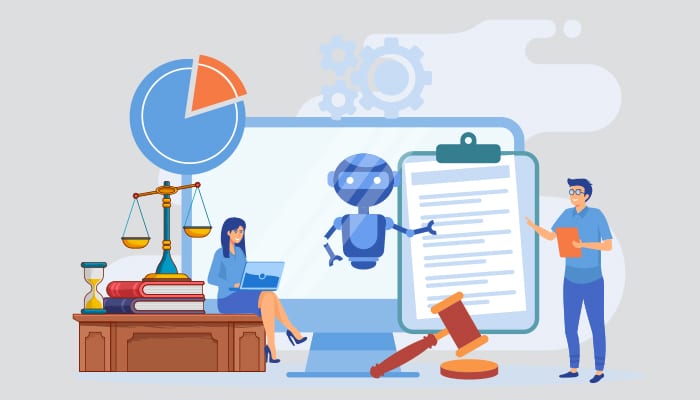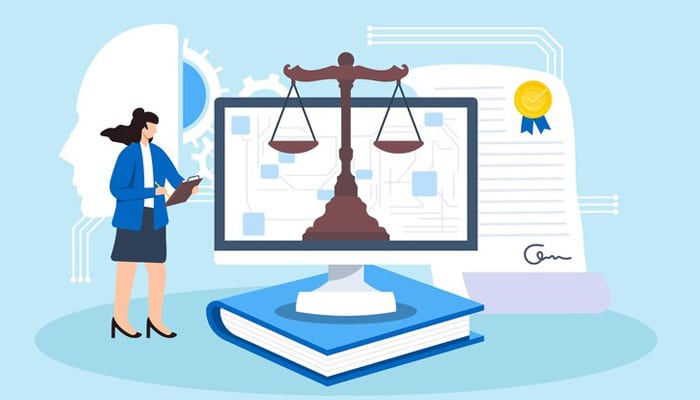Introduction
In the world of law, technology is shaking things up. It’s making legal work faster and more accurate, ultimately delivering better results for clients while saving money. But don’t worry, lawyers aren’t going away. Instead, routine and time-consuming legal tasks are being taken over by AI.
AI-powered tools are lightning-fast at sifting through vast legal documents, laws, and court decisions, identifying crucial information, and presenting it effectively. This transformative capability is exciting, but it also raises important questions about privacy, fairness, and the role of humans. Therefore, while legal research AI is a game-changer for the legal world, we must use it wisely and think carefully about its impact.
Legal research and writing services, where information is king, are being revolutionized by Artificial Intelligence. In this article, we’ll explore how AI is changing legal research, making it quicker, and more precise, and helping lawyers make smarter decisions.
The Transformation of Legal Research with AI
The legal profession is undergoing a rapid transformation with the integration of AI into legal research. This shift represents not just an evolution but a full-scale revolution. Legal professionals traditionally relied on statutes, regulations, case law, and scholarly articles to build robust legal arguments, a process known for its time-consuming nature and susceptibility to human error, involving manual searches and hours of research.
AI simplifies legal research significantly. It streamlines the process by allowing legal AI professionals to navigate vast databases using plain English, eliminating the need for complex search terms.
AI excels in speed and accuracy. The content related to the law by artificial intelligence is as accurate as the manual law content. While humans can tire or make mistakes, AI tirelessly and accurately analyzes legal documents. It identifies relevant information and presents it clearly, saving time and improving quality.
AI empowers legal practitioners by providing comprehensive, up-to-date information and valuable insights. It doesn’t just offer data; it uncovers trends and correlations that might be missed by humans, making it easier to make well-informed decisions.
In the legal profession, time is valuable. AI legal tech isn’t just an option; it’s necessary for those who want to excel. It saves time, enhances accuracy, and ultimately serves clients better. It complements legal expertise, making the profession more efficient and accurate.
The Role of AI in Enhancing Legal Services
Legal research AI not only simplifies tasks but also enhances the quality of services lawyers offer. Let’s examine how AI elevates client services, reduces costs, and fosters legal innovation.
- Reducing Costs and Increasing Accessibility
AI streamlines legal processes, leading to cost reductions. Traditional legal research can be expensive, with subscriptions to legal databases and labor-intensive manual research. AI-driven tools significantly reduce these costs, making legal services and artificial law services more accessible to a broader range of clients.
- Enhanced Client Services and Transparency
AI goes beyond cost savings, enhancing client services. Lawyers provide more accurate information, fostering trust. Clients can make informed decisions, knowing they receive reliable legal counsel.
- Legal Innovation through AI Integration
AI legal tech integration isn’t just a minor change; it drives legal innovation. Legal professionals explore new strategies and creative solutions. Automation and unique insights foster the evolution of the legal profession.
Enhancing Efficiency in Legal Document Preparation
AI processes legal documents very quickly and accurately. It doesn’t get tired, distracted, or constrained by time, ensuring fast and precise analysis. This is especially beneficial in high-pressure legal situations, time-critical tasks, or when dealing with a large volume of research. Lawyers can now navigate the complex legal landscape with a dependable legal AI assistant.
- Comprehensive and Timely Information
In law, having access to complete and current information is crucial. AI research tools do just that. They continuously watch legal databases, instantly adding new information and changes. This ensures that legal professionals always have the latest legal insights, allowing them to provide the best advice to their clients based on the most recent legal precedents and rules.
- Equipping Lawyers with the Latest Insights
The legal field is always changing, and it’s essential to keep up with these changes. AI not only saves time but also provides lawyers with valuable insights from extensive data and predictive analysis. It identifies emerging legal AI trends, potential risks, and beneficial strategies, making AI an essential tool for lawyers who want to stay competitive.
Predictive Analytics and Legal Research
Predictive analytics in legal research utilizes AI legal tech algorithms to analyze extensive historical legal data, uncovering patterns, trends, and valuable insights that humans might overlook. By examining past cases with similar characteristics, AI generates predictions about the likely course of a case, serving as a valuable resource for legal practitioners.
Leveraging Historical Data for Informed Decisions
AI’s predictive capabilities rely on historical legal data, ensuring data-driven decisions. This approach equips lawyers with insights into likely court rulings, enabling effective approaches.
In a profession where client outcomes are paramount, predictive analytics isn’t just a tool; it’s a strategic advantage. It empowers legal practitioners to make informed decisions and offer clients the most effective counsel.
Data Privacy and Security
Client data protection is a top priority. Legal professionals must ensure robust data security in AI systems, including encryption and access controls, to prevent breaches and unauthorized access.
- Safeguarding Client Data
Client data is sensitive and confidential, making its protection a top priority. Legal professionals must ensure that AI systems have robust data security measures, including encryption and access controls, to prevent data breaches and unauthorized access.
- Ensuring Compliance with Data Privacy Regulations
Compliance with data privacy regulations, such as GDPR and CCPA, is essential. Legal professionals must align AI systems with these regulations to uphold legal ethics and protect client data.
- The Challenge of Algorithmic Bias
Algorithmic bias poses a significant challenge. Legal professionals need to be vigilant in identifying and mitigating bias in AI systems to ensure fairness and just outcomes.
Transparency and Accountability
In the AI-powered legal research era, transparency and accountability are of paramount importance in the legal profession. Let’s highlight the significance of understanding AI algorithms, the necessity of transparent AI, holding AI accountable for its decisions, and how the legal field prepares for an AI-enhanced future.
- Understanding AI Algorithms
Transparency and accountability start with a clear understanding of AI algorithms at the core of legal research systems. Legal professionals must grasp how AI reaches conclusions, the data it relies on, and the decision-making processes. This comprehension empowers lawyers to interpret AI-generated results, question the AI when required, and ensure its alignment with ethical standards.
- The Need for Transparent AI
Transparency is the bedrock of trust in AI. Legal professionals advocate for transparent AI systems, rejecting the concept of the law of artificial intelligence. Instead, they emphasize the need for understandable AI processes. Transparent AI allows for scrutiny and validation, assuring that AI-generated insights are reliable and free from bias.
- Holding AI Accountable for Its Decisions
AI is a tool, not an artificial lawmaker. It is vital to establish mechanisms for auditing and reviewing AI-generated recommendations or predictions. This accountability ensures that AI serves the legal profession’s objectives rather than assuming an autonomous role.
The Future of Legal Expertise
As AI becomes an integral part of legal research, the future of legal expertise is evolving. Here’s how legal education is adapting, the changing roles of legal professionals, and the preparations being made for a legal landscape enhanced by AI.
- Evolving Legal Education
Legal education is adapting to include AI-related coursework. Future legal professionals are learning how to leverage AI tools in their practice, understand AI’s implications for the law, and ensure ethical AI usage. This evolution of legal education prepares lawyers to embrace AI while upholding their professional standards.
- The Changing Role of Legal Professionals
AI is shifting the roles of legal professionals. While AI handles routine tasks, legal professionals can focus on higher-level strategic thinking, advocacy, and interpreting AI-generated results. The AI law field is witnessing a transformation where lawyers collaborate with AI, becoming more efficient and effective.
- Preparing for the AI-Enhanced Legal Landscape
In preparation for an AI-enhanced legal landscape, legal professionals need to stay informed about AI developments, understand the potential and limitations of AI, and adapt their practice to leverage AI tools effectively. Being proactive and well-prepared allows legal experts to navigate the evolving legal field with confidence.
In Conclusion,
AI rapidly transforms law, enhancing, not replacing, lawyers. It streamlines research, boosts efficiency, saves time, cuts costs, and improves client services.
AI doesn’t just speed things up; it also enhances accuracy. It helps lawyers find essential information in vast databases. It empowers legal professionals with the latest insights and predictive analytics, allowing them to serve clients better. But AI also come with challenges. Data privacy and security are vital, as is the need to avoid bias in AI systems. Transparency and accountability are essential to ensure trust in AI.
In this evolving landscape, legal research and writing services are adapting, equipping lawyers with AI skills and ethical awareness. As AI reshapes legal roles, professionals can focus on strategic tasks. Staying informed, understanding AI’s boundaries, and adapting practices are crucial for an efficient and responsive legal profession.
If you are looking for Legal Researcher services, contact us and we will take care of all requirements.








